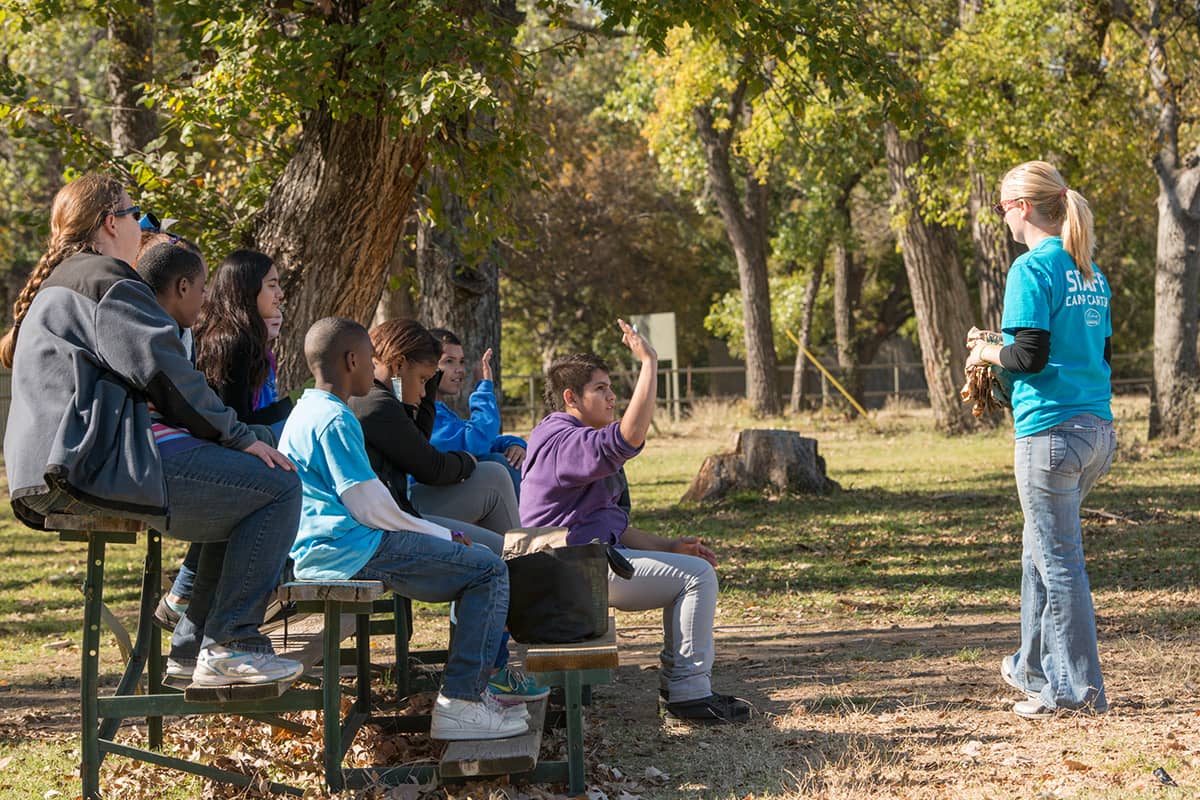What is Summer School? Each year, it is estimated that more than 1.5 million students in average participate in some form of summer schools in the US. In Europe, especially countries like in UK, Germany, and France, summer schools are also quite popular. Thousands of international students attend summer schools in Europe yearly. In Asia, particularly China, Japan, and South Korea, summer schools are becoming increasingly popular, with an increasing number of students attending both local and international summer programs. This guide will lead you to understand comprehensively what is summer school, and tell you some useful information about it. If you are interested in the summer school, just take a look.
What is Summer School?
Summer school is popular for a long time, but maybe some of you haven’t known the exact definition of summer school.
Definition of Summer school
Summer school refers to educational programs that take place during the summer holiday, typically outside of the standard school year. These programs can be offered by schools, universities, private institutions, or even specific organizations.
Key Features of Summer School
- Short Duration: Unlike regular school terms, summer schools are usually shorter in duration, making them an attractive option for students who want to accelerate their learning or pursue an interest outside the regular school calendar.
- Flexible Schedule: Summer schools may operate during different times of the year. Some institutions offer residential programs, while others provide day programs or online courses.
When Does Summer School Start?
The start dates for summer schools can vary depending on the country, institution, and the specific program. However, most summer schools are generally scheduled to start between late May and early June.
How Long Does Summer School Last?
How long is summer school? Summer schools usually last anywhere from a few weeks to two months, depending on the program’s goals and the institution hosting it.
To help you understand the different starting time and duration of summer school in different countries or regions, we sort out a general table to show you the differences.
| Region | Starting Time | Duration |
|---|---|---|
| United States | mid to late June late May |
4-8 weeks |
| United Kingdom | late June to early July | 3-6 weeks |
| Europe | late June and early July | 2-6 weeks |
| Asia | early July | 1-4 weeks 6 weeks |
| Australia | from December or January | 4-8 weeks |
The differences of start dates of summer school are often affected by several factors:
- Type of Program: Academic, remedial, or enrichment-focused programs may have different start dates.
- Institution Type: High school, college or university, and private institutions might offer different timelines.
- Geographical Location: Summer in the Northern Hemisphere is usually in June-August, but in the Southern Hemisphere, it’s in December-February.
What is the Purpose of Summer School?

Broadly, summer schools are designed to provide educational opportunities outside of the regular academic calendar. They serve a variety of purposes, including academic enrichment, remedial education, professional development, and specialized training.
- Academic Focus:
Many summer schools offer courses in subjects such as mathematics, science, literature, and language arts. Some focus on university preparation, allowing high school students to experience college-level courses.
- Language Programs:
A large number of summer schools are language-focused, particularly English immersion programs for international students. These programs are aimed at improving language proficiency in a short time.
- Remedial and Catch-up Programs:
Some summer schools are designed for students who need to catch up on missed coursework or improve their grades in certain subjects. These programs are often targeted at middle and high school students.
- Enrichment and Specialization:
For students seeking to broaden their knowledge in specific fields such as arts, technology, or business, summer schools may offer specialized courses or camps designed to nurture particular skills and interests.
- Networking and Socialization:
For many students, summer school offers the opportunity to meet peers from different backgrounds, build friendships, and network with like-minded individuals. This is especially true for university summer programs, which often bring together international students from various countries.
- College Admissions and Resume Building:
Some students attend summer school to enhance their college applications or resumes. For example, high school students may attend specialized summer programs or university-led courses to show their academic dedication and personal growth.
Why Students Go To Summer School?

The summer schools provide students with courses in various purposes. After students achieve the goals of the summer school, what can students gain from the special experience?
- Increase Self-Confidence:
Successfully completing a summer school program, particularly one that challenges students to learn new material or skills, can significantly boost a student’s self-esteem. They see firsthand that they are capable of handling new and challenging tasks.
- Learn to be Independence:
Especially in residential summer school programs, students gain a sense of independence as they live away from home, manage their daily routines, and solve problems on their own. This helps build maturity and self-reliance.
- Gain Inspiration and Motivation:
Summer school often exposes students to new ideas, topics, and fields of study. This can ignite a passion for learning and motivate students to pursue their academic goals with renewed energy and enthusiasm.
- Meet Like-Minded Peers:
Summer school provides students the chance to meet others with similar interests or academic goals, often creating lifelong friendships and connections.
- Diverse Social Environment:
Many summer programs attract students from different regions or even countries, allowing participants to interact with people from diverse backgrounds. This can be a valuable social experience and help students develop a global network of peers.
- Explore Artistic Talents:
For students interested in the arts, summer programs offer opportunities to refine creative skills like painting, music, dance, and theater. Students can work with professional artists or instructors and may even perform or showcase their work.
- Develop New Hobbies:
Summer school can be a time for students to explore areas they wouldn’t normally study during the school year, such as photography, film production, or fashion design, helping them discover new passions or career aspirations.
- Realize Personal Achievement:
Completing a summer program successfully can leave students with a strong sense of achievement. This boosts their motivation and provides them with tangible progress toward their long-term goals, whether academic or career-focused.
How Does Summer School Work?
Whether it’s aimed at academic enrichment, remediation, university preparation, or language learning, each summer school program has its own set of guidelines, schedules, and objectives.
- Enrolment Process:
Summer schools usually require an application. This might include submitting academic records, letters of recommendation, or personal statements. Some university-based summer schools may have a more competitive application process, especially for specialized programs or prestigious institutions.
- Extracurricular Activities:
Many summer schools, especially those held abroad or at universities, incorporate cultural activities like excursions, museum visits, or group outings to enhance students’ experience. For language immersion programs, this is especially common. Some programs focus on extracurricular courses like sports, arts, or music, offering opportunities for students to develop or enhance their skills outside the academic setting.
- Assessment and Certification:
Depending on the type of summer school, students may be required to complete assignments, participate in group projects, and take tests. Feedback is often provided to help students improve in areas where they may be struggling. Upon completion of certain programs, students may receive a certificate or diploma, especially in university preparatory or language immersion programs, which can enhance their academic or professional resumes.
Categories of Summer Schools

Targeting at different groups of students, the summer school can be also divided into several categories. They provide corresponding courses to their audiences based on their design.
- Secondary School Summer Schools
Middle and high school summer programs cater primarily to students aged 11-18 and are designed to serve a variety of academic, personal, and professional goals.
- College Summer Schools
College summer programs are generally for undergraduate students (including high school students who are taking college-level courses). They provide a range of opportunities, from earning credits to exploring various subjects.
- Specialized Summer Schools
These programs are typically more niche and cater to specific interests or professional fields. They might be organized by private institutions, universities, or independent organizations.
- Online Summer Schools
Online summer programs are gaining popularity, especially due to their flexibility and global reach. These programs are held virtually, allowing students to participate from anywhere in the world.
Types of Summer School Courses
What is summer course? What kind of summer school courses are you interested in? If you are a middle school student, you may want to participate in some preparation courses for universities. Actually, there are some other choices for students who are aimed to gain something from the summer school.
- Academic Courses
These courses focus on core subjects and are designed to either help students catch up, advance their knowledge, or prepare for future academic challenges. Foe example. The mathematics, science, English, foreign language, literature, history and social studies.
- Advanced Placement Courses
AP courses challenge students and provide them with an academic experience equivalent to a first-year college course. These courses are rigorous and often focus on critical thinking, problem-solving, and in-depth exploration of specific subjects. AP courses are available in a variety of subjects, including math, science, history, languages, and the arts.
- Honors Courses
Honors courses are typically more rigorous than standard high school courses, but they are not as intensive as AP courses in terms of workload or the complexity of the material. These courses often focus on developing higher-order thinking skills like analysis, synthesis, and evaluation. While they do not have an external exam like AP courses, honors courses can help students prepare for AP classes or university-level work.
- College Preparatory Courses
These courses are focused on helping students prepare for the transition to college by developing the necessary academic skills and knowledge. The goal is to provide students with the tools and experience they need to succeed in a more rigorous, independent academic environment.
How to Choose A Summer School Program

It is not a complex process to find the summer schools, because there are numerous information on the Internet. You can start with your high school or the local education authority which often provide details about summer school on their websites. The university websites can be also payed attention to. There are many information about a range of summer programs on some online platforms.
However, this doesn’t mean it would be easy and quick to find the right and appropriate one for you. Here are some summer school tips for you.
- Know what You Want
You should start by clarifying your goals. The identification of your goals decide your choice for the first step. For example, if you want to catch up on high school math, you can look for programs focused on math remediation or credit recovery.
- Find Your Interests
Summer school is a great opportunity to explore the areas where your interests are. The interests bring you passion for it. Then you can concentrate on the summer school to a great extent. You would better choose a summer school which can match both your interests an needs.
- Check Duration and Location
Time and place are important for the summer school choice. You have to think about where you want stay in your summer “vacation”, home or abroad? Between the convenience and challenge, you have to make the decision. Of course, consider whether the starting time and duration is identical to your arrangements in case of disturbing your plan.
- Evaluate Program Quality
Ensure the program of summer school is worth going. You can do some research on the program through investigating whether it is provided by a reputable institution such as university or well-known organization. You can also search for the review on the online forums social media or alumni feedback.
- Clear the Cost
Most summer schools need to pay the tuition fees. It varies widely due to the prestige and resources offered. University-based programs often charge higher than the community-based. But there are scholarships and financial aid provided sometimes. You can get the reduction on the cost. Except for the tuition, the accommodation, transportation and materials fees should be also considered.
- Review Curriculum
You have to make sure the program’s curriculum and schedule align with your goals. Is it structured to give you the depth of knowledge you are looking for? Is it a program providing hands-on opportunities such as labs, internships, field trips or group projects? If you’re aiming for SAT/ACT prep or college credits, ensure the program has a clear focus on these outcomes and that it’s accredited to offer such credits.
What You Should Do in Summer School?
It is essential to stay focused once you are in the summer school. You should manage your time well, and make the most out of experience. You should do something to make your summer school experience successful and fulfilling. You can make it through focusing on your courses, engaging with your coursework, balancing your time, and taking care of your physical and mental health. Being proactive, building connections, and maintaining a positive mindset would help you enjoy the process.
Find A Student Accommodation with uhomes.com
If you are a student who is going to attend summer school especially abroad, you may need to think about the question of short-time accommodation there. For example, you may want to find a student housing in New York or a student accommodation in London, where the expenses of house are expensive.
It can be easy as you choose us uhomes.com for our services such as 1-on-1 professional support, verified listings, price-match guarantee, and exclusive offers. You can get a nice house here to enjoy your college life!
Conclusion
What is summer school? Summer school provides students with a unique chance to accelerate their learning, catch up on missed coursework, or explore new academic and personal interests. Whether you’re looking to prepare for college, recover credits, or dive deeper into a subject you love, summer school programs provide a focused environment to achieve your goals in a condensed, yet enriching time frame. If you’re considering summer school, it’s not just about keeping up with your studies; it’s about expanding your horizons, boosting your academic confidence, and getting a head start on your future success. Embrace the experience, and make the most of your summer—academically and personally!
FAQ
What is the meaning of summer school?
Summer school refers to educational programs offered during the summer month, typically outside the regular school year. These programs can serve various purposes such as remediation, acceleration, enrichment and preparation.
What do you have to do in summer school?
What you have to do in summer school depends on the type of program you are attending. Generally, if you go to the summer school, you are expected to have classes regularly, complete your assignments and projects, take exams, participate in activities, and socialize.
How long is summer school usually?
Summer schools usually last anywhere from a few weeks to two months, depending on the program’s goals and the institution hosting it. It typically lasts between 3-8 weeks. Programs are condensed to fit into the summer months, so while the duration is shorter, the pace can often be faster than during the regular school year.
Is summer school the same as normal school?
Summer school is not the same as normal school although they share some similarities. The differences between them are: the purpose of summer school is to address specific academic needs, but the normal school is aimed to follow a broader curriculum which includes a set series of subjects and learning objectives.
Is summer school harder or easier?
Whether summer school is harder or easier can be decided by what kind of program you attend. For students who want to catch up, it can be harder because the need to cover a lot of material in a short time. But for students who are getting ahead or doing enrichment, it would be easier.
What is summer school in high school?
Summer school in high school is an educational program offered during the summer months, usually outside the regular academic year. It serves different purposes depending on the student’s needs, but it generally focuses on either catching up, getting ahead, or enriching learning.
What is summer school in university?
Summer school in university is a special academic program that takes place during the summer months, outside the regular fall and spring semesters. It allows university students and sometimes even high school students or non-degree seekers to earn academic credits, catch up on coursework, or explore new subjects.
What is summer school like?
Summer school is typically intense and fast-paced because it has condensed schedule, frequent assignments and exams. It provides more focused classes which need personalized attention and engaged learning. There are also some cultural and social activities that can give you some fun. Summer school is typically a more intense, academic-focused experience than regular school.








